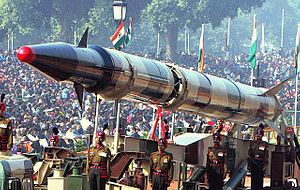In 2008, the NSG exempted India from the requirement adopted by the NSG in 1992 banning nuclear cooperation with any state that had not accepted IAEA (International Atomic Energy Agency) comprehensive safeguards. That move allowed India to engage in nuclear trade with NSG members. India is now bidding for NSG membership. It is argued that exempting India once again from the Nuclear Non-Proliferation Treaty (NPT) condition would undermine the Group. The process of negotiations during the NSG waiver enables us to examine the prospects of India becoming a member.
India received the NSG waiver after some tough negotiations. India got its exemption on the basis of certain non-proliferation commitments to which it agreed under the India-US Civilian Nuclear Agreement. These commitments included separating its civilian and military nuclear facilities in a phased manner; placing civil nuclear facilities under IAEA safeguards; signing and adhering to the IAEA’s Additional Protocol; continuing its unilateral moratorium on nuclear testing; working with the United States for the conclusion of the Fissile Material Cut-off Treaty (FMCT); refraining from the transfer of enrichment and reprocessing technology to states that do not have them and supporting international efforts to limit their spread; introducing comprehensive export control legislation to secure nuclear material; and adhering to the Missile Technology Control Regime (MTCR) and NSG guidelines.
It was reported that NSG members were divided into three groups, according to their national policies towards the waiver. The first group of countries, motivated by mercantile interests, strongly supported the exemption. Thus group consisted of France, Russia, and the United Kingdom. The second group was “like-minded” countries, small states with a strong nonproliferation stance, and included Austria, New Zealand, the Netherlands, Norway, Ireland, Sweden, and Switzerland, and wanted to include strong nonproliferation conditions in the draft. The third group of countries, which came out in favor of the exemption but were not enthusiastic, included Germany, Japan, Canada, and Australia.
The like-minded countries wanted to include conditions in the waiver such as a clause that would restate the desire of the Group for universal membership in the NPT, a legally binding nuclear testing moratorium, a “review” provision in case of India’s non-compliance with the nonproliferation commitments, and a provision denying the transfer of enrichment and reprocessing (ENR) technology.
They failed to get these conditions, as they were unacceptable to India. A compromise formula was suggested, in which the concerns of the like-minded states would be reflected in a chairman’s statement, but they were not pleased with this formula. As the like-minded states insisted on strong conditions linking the waiver and the Indian nonproliferation commitments, the United States and India had to introduce further changes in the draft. The U.S. had to revise the waiver draft three times to meet their concerns. The final draft contained the minor changes but still lacked substantial changes. After rigorous U.S. diplomacy, and two informal assurances, the like-minded states eventually agreed to the waiver. These assurances were that no member state had a policy to transfer sensitive nuclear technology to India and that the trade would terminate if India resumed nuclear testing.
This waiver was possible because of intense American diplomacy, with help from France, Russia, and Britain in reaching consensus. The Bush administration was keen to get approval as it had only weeks to get Congressional approval for the U.S.-India agreement before U.S. elections, and receive the credit for the initiative. Nucleonics Week on August, 21, 2008, quoted a diplomat from a uranium exporting country as saying, “in the end, most of the true nuclear suppliers in NSG are going to support the exemption request with few changes.” It added that France and Britain urged the “EU as a whole to support the US initiative on India.” Reports quoted many diplomats as saying that “intense U.S. pressure for the waiver involved oversight phone calls to Presidents and Prime Ministers of holdout countries.” According to U.S. administration officials, ‘[Condoleezza] Rice made at least two dozen calls to lean on allies to allow for the India-Specific waiver’.
India’s NSG membership seems to be a distant possibility; the Obama administration has been committed to supporting the bid but in contrast to the Bush administration there is no urgency. The U.S. has urged India to play a more proactive diplomatic role in persuading the hold-outs to support its membership, while India insists that Washington take on the job of achieving a consensus in the NSG, just as the Bush administration did in the waiver negotiations. During the waiver negotiations India made it clear that, according to its reading of commitments in the 2005 agreement, the United States was responsible for delivering a “clean and unconditional exemption” from the export guidelines of the Nuclear Suppliers Group. India expects the same U.S. role in the membership negotiations, but for the Obama administration this is not a priority foreign policy issue.
The waiver negotiation history suggests that India will again face stiff resistance and demands for greater nonproliferation conditions, but one can also assume that India will work hard to avoid any such conditions due to opposition at the domestic level. Like the waiver, India and the United States will have to invest significant diplomatic energy to get the required consensus for NSG membership. India is already abiding by the NSG Guidelines without being a member, and the gain of Indian adherence to the guidelines can be kept without adding India to the NSG and compromising the eligibility criterion.
Saira Bano is a visiting fellow at the Stimson Center, Washington D.C.

































